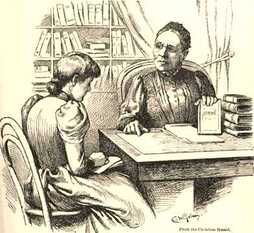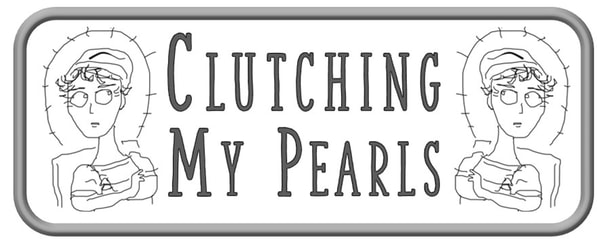| This blog explores social attitudes in Jane Austen's time, discusses her novels, reviews forgotten 18th century novels, and throws some occasional shade at the modern academy. The introductory post is here. My "six simple questions for academics" post is here. |
 Morally improving
Morally improving The Metropolis received no reviews but if it had, I think the reviewers would have called it a book--to use their phrase--that you could not safely put into the hands of your daughter or sister. It is too detailed in its depiction of vice, and the vices and crimes committed in the book (fornication, gambling, cheating at gambling, highway robbery) are not sufficiently condemned or punished. The Decision (1811), while going over much of the same ground, and in fact including a main character who commits criminal acts, would be safe for a girl to read because it is overtly religious and didactic. A reviewer said: “We trace in these volumes a laudable endeavour to convey as much moral instruction as could be admitted into a work of fancy.” Yes, The Decision is stuffed like a plum pudding with the wholesome raisins of morality. The title refers to the heroine's decision to put her father's wishes ahead of her own, and later, to turn down a fortune in exchange for marriage.
The Decision begins with a long and confessional letter from Charles Arundel to his old friend Mr. Beverly. Arundel married for love but becomes a gambler and a philanderer. At his dying uncle’s bedside, he sees that he’s been cut out of the will, which would lead to his ruin. He destroys the will and even poisons the uncle. He lives with his guilt until later on in life, after he is widowed, he decides to go to the West Indies and meet the young relative whose father was unknowingly cut out of the will.
The mention of the West Indies will bring thoughts of slavery to mind for the attentive modern reader, but there is no mention of slavery or colonial exploitation as a sin or even as a cause of remorse in this book--a book which features many people who do things that they regret, such as marrying for ambition. Once again the West Indies are a plot device to remove the father from the action, so the heroine can live with the Beverly family.
When Charles Arundel goes to the West Indies to atone for the crimes of his younger days. He leaves his daughter Isabel with Mr. Beverly and his family. Isabel is lovely and intelligent, a fact that doesn’t escape the notice of Mr. Beverly’s son Valcourt, but he is already engaged to a society belle. Rounding out the characters, we have some sisters and the mother, Mrs. Beverly, who makes life miserable for her husband with her extravagance and socializing. She believes she's entitled to do as she likes because she brought a fortune to the marriage, but she runs the family into debt. A reminder that the often-repeated notion that “women couldn’t inherit” back then is incorrect, and that wives could bankrupt and ruin their families just as husbands or irresponsible sons could. We’re told she ruins several tradesmen’s families when she doesn’t pay her bills. The Beverly women, and Valcourt's vain and shallow fiancée are contrasted with the virtuous and principled Isabel. We learn all about the faults of Mrs. Beverly--a cold wife, a partial and ill-judging mother--through the gossipy and unflattering things Isabel writes in her letters to her father about her host family. Mrs. Beverly's sins are first punished by the death of her youngest son, whom she both over-indulged and neglected. Mr. Arundel arranges matters so that Isabel pays the price for his wrongdoings.
| | Stir in a few more rivals for Isabel's hand, and add a series of impediments keeping the hero and heroine apart. For once I’m not going to give all the plot spoilers; suffice it to say I thought it was good melodramatic fun and there was only one amazing coincidence. Being virtuous does not spare the main characters from suffering and hardship, but misbehaviour brings others sorrowing to their graves. It’s a lively soap opera interspersed with moral lessons. Silly and old-fashioned? Sure, but don't the phony videos posted on social media, depicting people who behave badly getting their comeuppance, show that people are just as drawn to morality plays today? |

The same anonymous author also wrote Willoughby, or Reformation, the influence of religious principles (1823), The Acceptance (1810), and Caroline Ormsby or the real Lucilla, interspered with sketches moral and religious (1811). “Lucilla” is a reference to the heroine of Hannah More’s staggeringly popular novel, Coelebs in Search of a Wife, which spawned a host of imitators. I just peeked into Caroline Ormsby, but I read Willoughby to see how this Willoughby compared with Austen's character. Willoughby Coventry is the only son of a respectable family. From the outset of the novel, Willoughby is a dissolute gambler and a selfish coward. The subtitle promises us that Willoughby will redeem himself, but why I should care whether he redeems himself or not, I don’t know.
The Coventry family--and the father--are finished off with more financial blows; a shipwreck in which they lose some property, and a bank failure. Willoughby responds with nervous collapse and is no help in supporting his mother and sister. He somehow manages to win the affections of a silly young heiress, because he is “fascinating” and “handsome.” The author wasn't able to show the fascinating side of this character, though, we are just told he's fascinating. The young bride exults, Lydia-like, in having her way: “When I look at the ring on my finger, and think I am married, it is so droll, I quite laugh at the idea.” Alas, the marriage soon goes sideways, and Willoughby continues to be a waste of space. He finally pulls himself together after a near-death experience in the third volume, and after his wife’s death, he finds happiness with a worthy woman.
Willoughby’s virtuous sister Elizabeth, on the other hand, doesn't hesitate to take a job as a governess to help support her mother and announces that it is no degradation to do so.
Our anonymous author specializes in virtuous females who are brought into desperate straits by the bad decisions of their male relatives, but these heroines are always resigned and saintly and display unconditional love for their wretched fathers. In The Decision, Isabel resolves to obey her dying father's injunction to marry her cousin Horatio, even though she's in love with Valcourt Beverly and he with her: “watching the altered looks and languid breath of her father, she almost gloried in the sacrifice of her own happiness, could it ensure to him the blessing of peace in these last eventful hours.”
In Willoughby, an off-stage character named Matilda consents to marry a rich man she doesn’t love to pay off her father’s gambling debts. Her husband dies, her father dies, and she dies of grief, so it’s hard to see what she gained by her sacrifice. But the author praises her up as a saint. This is evidently female behavior to emulate. Elizabeth at least ends up happily married with a convenient fortune.
This author espouses beliefs and a worldview which might appeal to some traditionally-minded readers, but I'm coming to feel that the moral codes promoted in these sentimental novels will prevent a revival of this and other forgotten authors. My own interest arises out of looking at what these novels say about the preoccupations of the society they were written for, what publishers offered to readers, what critics praised or condemned, and how it compares to Austen.
Austen handles the same topics and Christian beliefs but she's quite subtle and indirect: you can catch the faintest allusion to redemption and salvation in Mansfield Park, her most didactic novel, when Fanny Price is worried that her cousin Tom Bertram’s illness might be fatal. “Without any particular affection for her eldest cousin, her tenderness of heart made her feel that she could not spare him, and the purity of her principles added yet a keener solicitude, when she considered how little useful, how little self-denying his life had (apparently) been.” That “keener solicitude” might sail right past a reader not familiar with Christian doctrines.
Jane Austen also kept the sordid stuff off stage in her novels. Willoughby’s seduction of Eliza, Maria Bertram Rushworth’s adultery with Henry Crawford, and Lydia living in sin with Wickham--they are all discussed at second-hand, not directly narrated. We never enter a bordello or a gaming hell with Austen.

After reading a lot of these novels, it really strikes me how often authors resort to beggaring a family through gambling debts or bank failures, or enriching a family through unexpected bequests of East and West Indian fortunes. It’s like a Regency game of snakes and ladders with heroes and heroines either tumbling down into financial ruin or suddenly climbing up to fabulous wealth, as their authors roll the dice and move them around the board. The Decision features a long-lost relative (actually in this case, an old friend) returning from the East Indies with a fortune to bestow on the heroine in time for her marriage. This is an exceedingly common plot device of the time. In Willoughby, one of Elizabeth's suitors comes into a fortune (one of those convenient uncles) and she is able to marry and give a home to her mother.
Austen found a different way to impoverish the Dashwood girls in Sense and Sensibility, but a small West Indian fortune comes to the rescue for Mrs. Smith in the final page of Persuasion.
In all three of these novels--The Decision, Willoughby, and Mansfield Park--the fact of slavery and colonialism is present in the background, but not held up for examination or condemnation. No consequences flow from the fact that the wealth which props up these families comes from chattel slavery despite the fact that these novels grapple with the questions of correct moral conduct as a central theme. Other authors did condemn slavery, and it is interesting to see such a wide disparity of consciousness about slavery in the novels of this era.
The works of this novelist have been misattributed to female authors such as Grace Kennedy, Barbara Hofland, and Jane West. But the reviewers of Caroline Ormsby speak of the author as a "he." The confusion seems to arise out of the fact that there were multiple novels titled Decision. Another possible clue is found in the second volume of Caroline Ormsby, which includes a letter from a mother to a daughter, advising her to avoid attempting to become a novelist, lest she neglect her domestic duties and make herself ridiculous. This, I suppose, makes it more likely that the author is a male, but I still suspect the writer is a female. However, I can't imagine any academic championing her as an author worth re-discovering.
We know nothing about the author of these books other than the fact that (s)he was conventionally religious. (S)he includes a minor character, a fanatical Methodist woman who despises all earthly enjoyments, in Willoughby. (S)he gives away nothing about herself in her prefaces, and merely repeats the moral lessons she intends to promote in the story. Her/his books were published by Henry Colburn.

 RSS Feed
RSS Feed